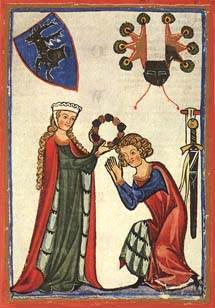The religion of love

Courtly love was not just a literary convention. It was (at least theoretically) a way of life, designed to create a courtier who was a model of wit, passion, and purity.
The long tradition of medieval courtly love was revitalized in the Renaissance by Baldassare Castiglione (1478-1529), who served at the court of the Duke of Urbino in Italy — a court famed for its support of art and learning. His influential handbook of ideal courtly behaviour, Il Cortegiano (The Courtier) was translated into English by Sir Thomas Hoby, one of several fine English translations which made classical and continental works accessible to readers of English.
The ladder of love
In The Courtier, there is an impassioned discussion of the nature of love, in which one of the characters, Peter Bembo, describes the way that earthly love can become elevated to heavenly love through a platonic process of stages, or steps on a ladder, beginning with the love of an unattainable, virtuous woman, and leading to love of God and all humanity.
In typical Renaissance fashion, Bembo associates these steps with the hierarchy of created nature:
And here after they had laughed a while, M. Peter proceeded. I say therefore that according as it is defined of the wise men of old time, Love is nothing else but a certain coveting to enjoy beauty. . . And because in our soul there be three manner ways to know [perceive], namely, by sense, reason, and understanding; of sense there ariseth appetite or longing, which is common to us with brute beasts; of reason ariseth election or choice, which is proper [appropriate] to man; of understanding, by the which man may be partner with Angels, ariseth will. . . .
Man, of nature endowed with reason, placed (as it were) in the middle between these two extremities, may through his choice–inclining to sense, or reaching to understanding–come nigh to the coveting sometime of the one, sometime of the other part. . .
Source: http://internetshakespeare.uvic.ca/Library/SLT/ideas/religion/courtlylove.html
You must log in to post a comment.